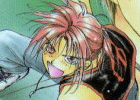Gravitation
| Genre: Comedy/Romance | ||
| Length: 12 Volumes | ||
| Allegiance: Gentosha/Tokyopop | ||
| Mangaka: Murakami Maki | ||
| Vintage: 1996 – 2002 | ||
| Intelligence Agency Report by: dheu | ||
| Shindou Shuichi is the singer and songwriter for the up-and-coming rock group Bad Luck. One day while composing lyrics for a new song, he accidentally runs into the famous author Yuki Eiri, a famous author who proceeds to reads his lyrics and then promptly tells Shuichi that he has absolutely no talent. Insulted and determined to prove him wrong, Shuichi tracks Yuki down and pushes his way into Yuki’s life. However, Shuichi’s insistence on changing Yuki’s opinion has much more far-reaching consequences than either of them could ever expect and transforms both of their lives forever. | ||
|
|
||
| Research Agent Report by: dheu | ||
| Plot Characters Impact Visual |
6.50 8.75 6.00 7.75 |
|
| Overall | 6.75 | |
| (not an average) | ||
| Gravitation, while technically classified as a comedy, is a series trapped between two polarizing concepts: drama and comedy. Simply put, it does not know into which category it falls, and as such, falls short in both. Ironically, it is the dramatic scenes which are the strongest aspect of this series, leaving the comedy, which makes up the overwhelming majority of the manga, to be the weak point. Unfortunately, as the dramatic scenes are few and far between, the entire series suffers as a result.
The art style for Gravitation is very rough and frenetic, and every page is very crowded with action and dialogue. The art is definitely unique, which immediately makes Gravitation stand out from countless other shoujo series. It’s not a particularly appealing style, but it is functional and can convey strong emotion when the mangaka wants it to. The characters are all very interesting, from the rambunctious Shuichi to the moody and complex Yuki, and their interaction is entertaining to observe. Furthermore, the plotline itself is definitely unique, which can be a difficult thing to find in shoujo manga. This series really shines when it seriously delves into the relationship between Yuki and Shuichi, and the effect that they have on each other. Yuki’s character development is naturally highlighted during these serious moments due to the deeper nature of his issues, but Shuichi also undergoes significant character development throughout the course of the story. Through their fumbling and rocky relationship, they give each other considerable support, and this slowly affects their wildly diverse outlooks on life as they grow. This developing relationship between Yuki and Shuichi is the focus of the first half of the series, and for the most part is only enhanced by the comedy that is interspersed throughout. If the series had continued this trend, I would have given it a much higher rating. However, once the series starts diving more into comedy and less into the emotional development of its characters, the tight focus of the plot is lost. The realistic relationship and issues between Shuichi and Yuki become replaced by outlandish events and over-the-top action designed purely for comedy. This is a shame because the strongest aspect of Gravitation is the way in which the characters are so well developed and the relationships between them are fleshed out – little of which is done in the last four or five volumes. When it is done, the moments are sandwiched in between annoyingly force-fed comedic sequences. – The most poignant scenes end up being dumbed down or even ruined by an ill-timed comedic gag. In comparison to the scene naturally easing out of the somber moment, the out-of-place frivolity is the equivalent of a hammer blow to the head. As a result, the character development for the final half of the series takes a huge step backwards, which is extremely disappointing after the intense first half. In the end, the strongest impression I received from this series is that it is completely unable to sincerely face the serious and deep emotions behind the characters’ life experiences. While Gravitation is technically a comedy and thus it is only natural that even the most serious events will quickly revert to humor, it is still frustrating to see the wasted potential displayed in those dramatic moments. When I read this series, I could feel the mangaka reaching out for some real character development… and then voluntarily drawing back before she got there. This made for a rather disappointing series to read, and I was left very unsatisfied by the story after I completed it. This is a decent series with some truly interesting characters that unfortunately could have been so much more.
|
||




